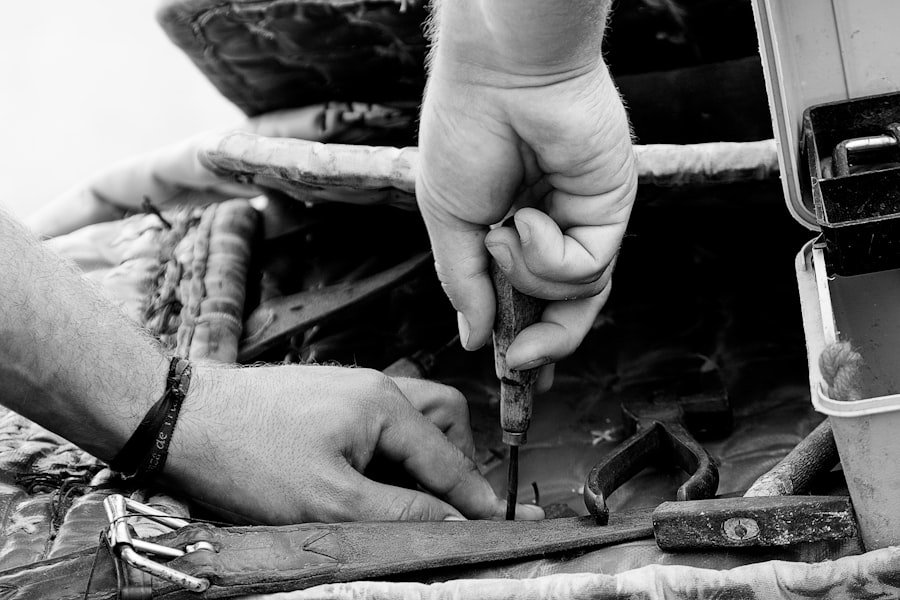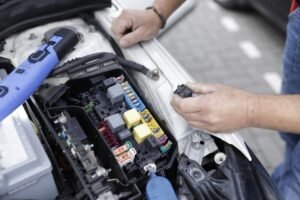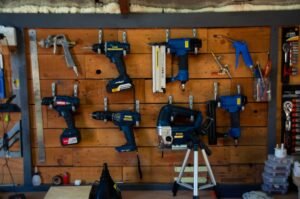In Dungeons and Dragons 5th Edition, tools are integral game elements that augment character capabilities and create opportunities for roleplaying and exploration. These items enable characters to perform specific tasks, including crafting, repairing, and gathering information. Each tool has distinct rules and applications, and characters can gain proficiency with particular tools through their class, background, or feats.
Tools are categorized into several groups, such as artisan’s tools, gaming sets, musical instruments, and vehicles. Artisan’s tools are utilized for crafting and repairing items, while gaming sets are employed for games of chance or skill. Musical instruments serve performance purposes, and vehicles facilitate transportation.
Each tool possesses a unique set of associated skills and abilities applicable in various scenarios, making them valuable assets for characters across different situations.
Key Takeaways
- Tools in D&D 5E are used for a variety of tasks, from crafting and repairing to gathering information and creating magical items.
- When choosing tools for your character, consider their background, class, and the type of campaign you are playing in order to select the most useful tools.
- Proficiency with tools allows characters to add their proficiency bonus to ability checks related to that tool, while tool checks are used to determine the success of specific tasks.
- Tools can be used in roleplaying and exploration to gather information, solve puzzles, and interact with the environment in creative ways.
- Proficient tools can also enhance combat by providing bonuses to attacks, defense, and other combat-related actions.
Choosing the Right Tools for Your Character
Tools and Background
A character’s background plays a significant role in determining which tools they should be proficient in. For instance, a blacksmith background would naturally lead to proficiency in smith’s tools, enabling them to craft and repair metal items. Similarly, a bard might choose to be proficient in a musical instrument, allowing them to perform and entertain others.
Tools and Party Dynamics
It’s crucial to consider how your character’s chosen tools will fit into the overall party dynamic. If your party lacks a character proficient in herbalism kit, for example, you might choose to become proficient in that tool to provide healing and support for the group. This can help fill gaps in the party’s abilities and create a more well-rounded team.
Tools in Combat
Some tools can be used in combat situations, such as alchemist’s supplies or poisoner’s kit. Therefore, it’s essential to consider how your character’s chosen tools will impact their combat abilities. This can significantly influence their role in combat and the party’s overall strategy.
Learning Proficiency and Tool Checks

In D&D 5E, characters can become proficient with certain tools through their class, background, or feats. Proficiency with a tool allows a character to add their proficiency bonus to ability checks related to that tool. For example, a character proficient with carpenter’s tools would add their proficiency bonus to any ability checks related to woodworking or building structures.
When using a tool in the game, the Dungeon Master may call for a tool check to determine the outcome of the character’s actions. A tool check is similar to a skill check, but it specifically relates to the use of a particular tool. The character rolls a d20 and adds their proficiency bonus and relevant ability modifier to the roll.
The result determines the success or failure of the character’s use of the tool.
Utilizing Tools in Roleplaying and Exploration
| Tool | Usage | Effectiveness |
|---|---|---|
| Dice | Randomizing outcomes | High |
| Character Sheets | Tracking stats and abilities | Essential |
| Maps | Visualizing environments | Highly useful |
| Rulebooks | Referencing game mechanics | Important |
Tools can be used in a variety of ways during roleplaying and exploration in D&D 5E. For example, a character proficient with cartographer’s tools might use them to create maps of unexplored areas, helping the party navigate through unknown territory. A character proficient with disguise kit might use it to create convincing disguises to infiltrate enemy strongholds or gather information from unsuspecting NPCs.
Additionally, tools can be used to gather information or resources during exploration. Characters proficient with herbalism kit might gather rare herbs and plants with medicinal properties, while characters proficient with navigator’s tools might use them to determine their location and plot a course through treacherous terrain. Using tools in these ways can add depth and realism to the game world and provide unique opportunities for storytelling and problem-solving.
Enhancing Combat with Proficient Tools
While tools are often associated with non-combat activities, they can also be used to enhance a character’s combat abilities in D&D 5E. For example, characters proficient with alchemist’s supplies might create potions or explosives to use in battle, providing additional options for dealing damage or providing support to their allies. Characters proficient with poisoner’s kit might coat their weapons with deadly toxins to inflict additional damage on their foes.
Some tools can also be used to create traps or fortifications during combat encounters. Characters proficient with tinker’s tools might set up mechanical traps to hinder their enemies’ movements, while characters proficient with mason’s tools might quickly construct barricades or defensive structures to protect themselves and their allies. Using tools in combat can add an extra layer of strategy and creativity to encounters, allowing characters to approach battles in unique and unexpected ways.
Multiclassing and Tools Proficiency

Gaining New Proficiencies
Multiclassing in D&D 5E allows characters to gain proficiency with new tools by taking levels in certain classes. For example, a character who multiclassed into the rogue class might gain proficiency with thieves’ tools, allowing them to pick locks and disarm traps. Similarly, a character who multiclassed into the artificer class might gain proficiency with tinker’s tools, allowing them to create magical items and constructs.
Complementing Existing Abilities
When multiclassing, it’s important to consider how the new tools gained from the additional class levels will complement your character’s existing abilities and playstyle. For example, if your character is already proficient with smith’s tools from their background, multiclassing into a class that grants proficiency with alchemist’s supplies might provide new options for crafting potions and poisons.
Expanding Your Character’s Skill Set
Multiclassing can be a great way to expand your character’s skill set and provide new opportunities for roleplaying and problem-solving. By gaining proficiency with new tools, characters can access new areas of expertise and develop unique abilities that set them apart from others.
Mastering Advanced Tool Use and Crafting in D&D 5E
As characters progress in D&D 5E, they may have the opportunity to master advanced tool use and crafting through feats or class features. For example, the artificer class has access to infusions that allow them to create magical items using artisan’s tools, while the forge domain for clerics grants additional abilities related to smith’s tools and metalworking. Feats such as Skilled or Prodigy can also grant characters additional tool proficiencies or expertise in existing tools.
Mastering advanced tool use and crafting can open up new possibilities for characters in the game world. Characters might create powerful magical items, construct elaborate traps and fortifications, or even build their own stronghold or workshop. These abilities can provide unique opportunities for storytelling and world-building, allowing characters to leave a lasting impact on the game world through their creations.
In conclusion, tools are an essential part of D&D 5E that can enhance a character’s abilities and provide unique opportunities for roleplaying and exploration. By choosing the right tools for your character, learning proficiency and tool checks, utilizing tools in roleplaying and exploration, enhancing combat with proficient tools, considering multiclassing and tools proficiency, and mastering advanced tool use and crafting, you can create a dynamic and versatile character that is well-equipped to face any challenge in the game world. Whether you’re a master craftsman creating powerful magical items or a cunning rogue picking locks and disarming traps, tools are an invaluable asset that can enrich your D&D experience and provide endless opportunities for creativity and adventure.
For more information on the importance of proficiency in tools in Dungeons and Dragons 5e, check out this article that delves into the complex story of Gypsy Rose Blanchard’s release and the tools she used to manipulate her situation. Understanding the intricacies of tools proficiency can enhance gameplay and storytelling in the world of D&D.
FAQs
What is tools proficiency in 5e?
Tools proficiency in 5e refers to a character’s ability to use certain tools effectively, as defined by the Dungeons & Dragons 5th edition rules. This proficiency allows characters to add their proficiency bonus to ability checks related to using those tools.
How do characters gain tools proficiency in 5e?
Characters can gain tools proficiency in 5e through their class, background, or by taking the Skilled feat. Some classes, such as the rogue, grant specific tools proficiencies as part of their class features.
What are some examples of tools proficiency in 5e?
Examples of tools proficiency in 5e include alchemist’s supplies, disguise kit, forgery kit, herbalism kit, navigator’s tools, poisoner’s kit, and thieves’ tools. These are just a few examples, and there are many more tools proficiencies available in the game.
How does tools proficiency affect gameplay in 5e?
Having tools proficiency in 5e allows characters to add their proficiency bonus to ability checks related to using those tools. This can be particularly useful for tasks such as crafting items, creating forgeries, picking locks, or navigating difficult terrain.
Can characters become proficient in multiple tools in 5e?
Yes, characters can become proficient in multiple tools in 5e. This can be achieved through their class, background, or by taking the Skilled feat, which allows characters to gain proficiency in any combination of three skills or tools of their choice.




















+ There are no comments
Add yours